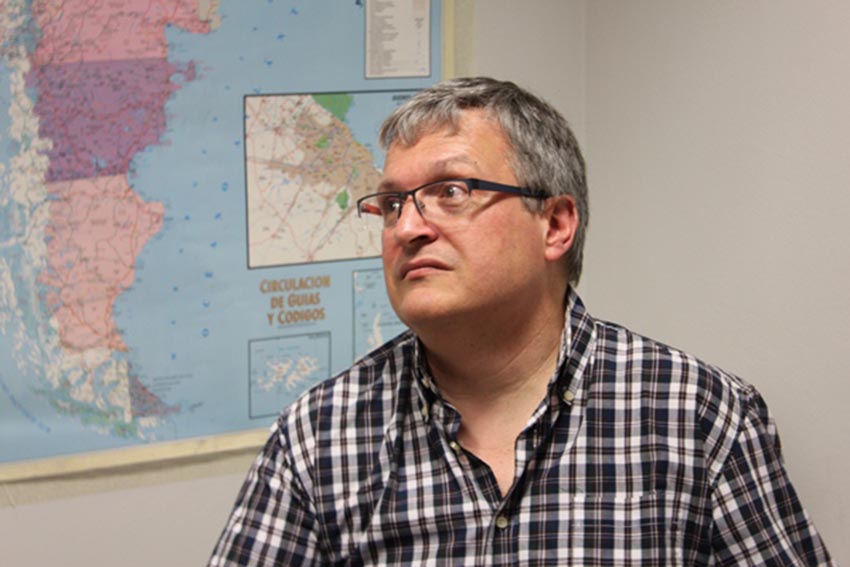Hargatik, La Plata. Since 2001, when our project online, there are many Basques and euskal etxeak in different countries that follow, on a daily basis, what is happening in the world of the Diaspora and in Basque cultures thanks to the information and liaison provided by EuskalKultura.com through its bulletin and website. “Many tell us that they find out what is happening in their own Basque club, or about Basque initiatives that are taking place in their places in Argentina, Australia, the US, or Uruguay through our work,” Joseba Etxarri, director of the initiative said.
“It might be true that ours is an unusual undertaking,” the journalist from Donostia reflects after more than 30 years of experience in the Diaspora behind him. “Since our work combines professional criteria, as the journalists that we are, with the vocation and the spirit of service that characterizes voluntary initiatives. We are not dependent on any institution, with the good and the bad that this brings along with it. Bad, in the economic sense above all,” he says with a smile. “We try to contribute our grain of sand reporting about activities and contributions that are carried out in the Diaspora in favor of our common Basque culture, as well as about general questions about the Basque culture that are of particular interest to Basques in the world,” he explains.
The Importance of Mutual Knowledge
They were pioneers, and it is the oldest publication of its kind. It was born of the conviction that a basic step to provide a future to the Basque clubs of the world “is mutual knowledge and the knowing about the activities and contributions that each one of the individuals or euskal etxeas carries out in their surroundings. Among other things, of instance, to be able to copy each other’s most interesting initiatives, to exchange ideas, to join forces on enterprises that have proven successful, or given the best results, or finding out how others have solved similar problems, to optimize efforts,” Etxarri says convinced. “Also to give people the recognition they deserve,” he added.
“The main value of EuskalKultura.com consists in our profound knowledge of the world of the Diaspora, or if you will, the different Basque Diasporas in different countries, and our commitment to informational support, to the best of our ability. We receive a lot of inquiries and requests for information, and for many Basque clubs and individuals we have become a close and trusted resource, and we are a kind of one mor Basque club, although specialized in providing information and communication. Our initiative has one foot in Euskal Herria and the other in the Diaspora, with extensive knowledge of both realities, that brings with it, a privileged perspective,” he says.
Shared Effort
Their main job and effort is dedicated to the daily emission of the newsletter as well as the constant updating of the website. “There, as well as in the agenda and the rest of the sections, you find room for the numerous activities that are carried out in Basque cultural in different parts of the globe. At the same time, we are aware that we only reflect a small part of the effort of Basques in the world, although it is sure reporting depends largely on the clubs themselves. On the other hand, our scope, in addition to encompassing the whole world in terms of Basque clubs, encompasses both the seven provinces, that is the Basque Autonomous Community, as well as Nafarroa and Iparralde. We include information about the six Navarran centers in Argentina, Chile and the Iparralde Basque Club in Buenos Aires.”
Our interviewee assures us that publishing the newsletter daily “is harder than what you might think. It obliges you to be in constant contact with the world of the Diaspora and the euskal etxeas, and to work on their timetable. With that comes the added difficulty of publishing in three languages, Basque, Spanish and English, which multiplies the task. And due to the popularity of social media, we have to also be constantly present, for example, on Facebook and Twitter, but also keeping in mind traditional media. Accomplishing our goal of disseminating and guaranteeing the presence of news from the Diaspora on as many forums as possible, like on radio programs, in addition to including this news, ad honorem, in the weekly Herria in Baiona.
“For all of that, our structure is reduced and now we come to the other peculiarity that characterizes us: the complexity of our readers. Beginning in 1998, on paper, and since 2001 on the Internet, our project is part of a shared effort, side by side with Basques and euskal etxeas all over the world. EuskalKultura.com wouldn’t make sense and wouldn’t be viable without the collaboration of this growing number of people, from Basque clubs here and there who send us information and photos of the activities that they carry out. Our work is based on this relationship of complicity and trust that have built bridges of information between Basques all over the world.”
“Humbly,” Etxarri continues, “I think that if EuskalKultura.com didn’t exist, that we would have to invent it. Our work is that of interrelation, communication and diffusion that is fundamental and should be established and lavished, if we truly want to support, advance, and give future to our Diaspora,” he concludes.






 Send to a friend
Send to a friend Add comment
Add comment








